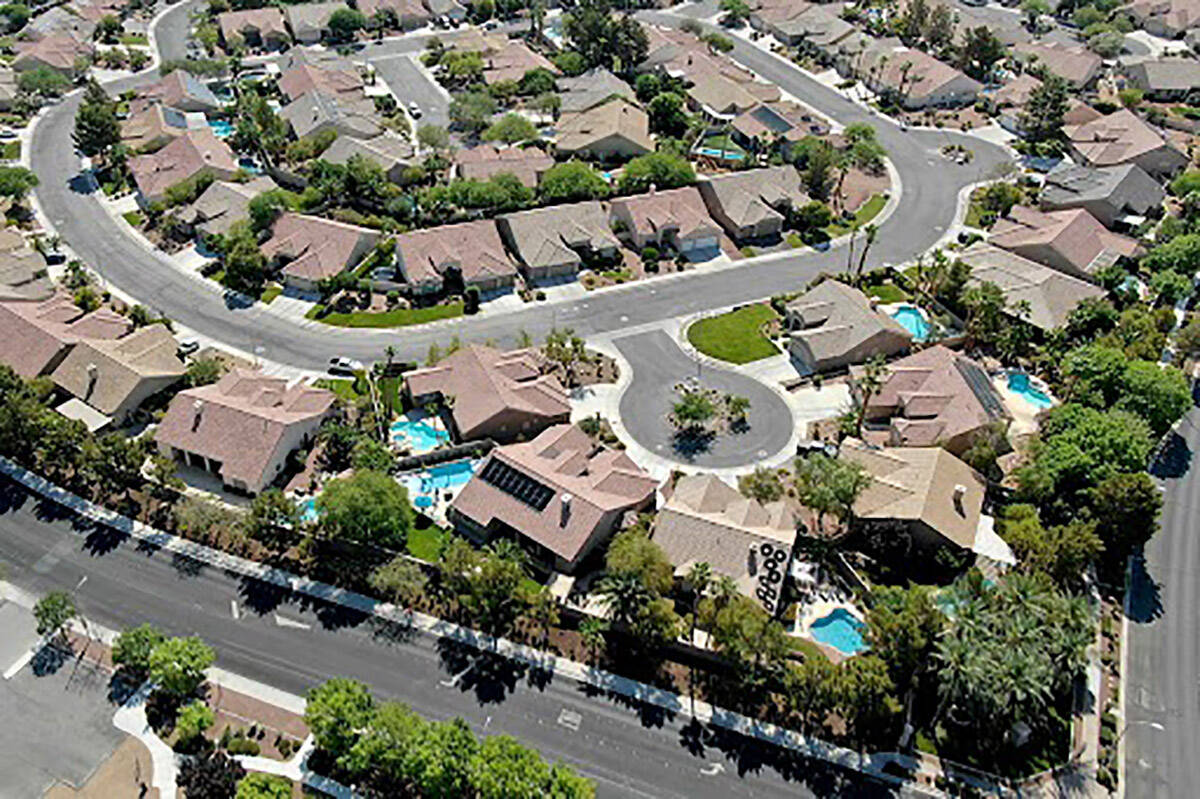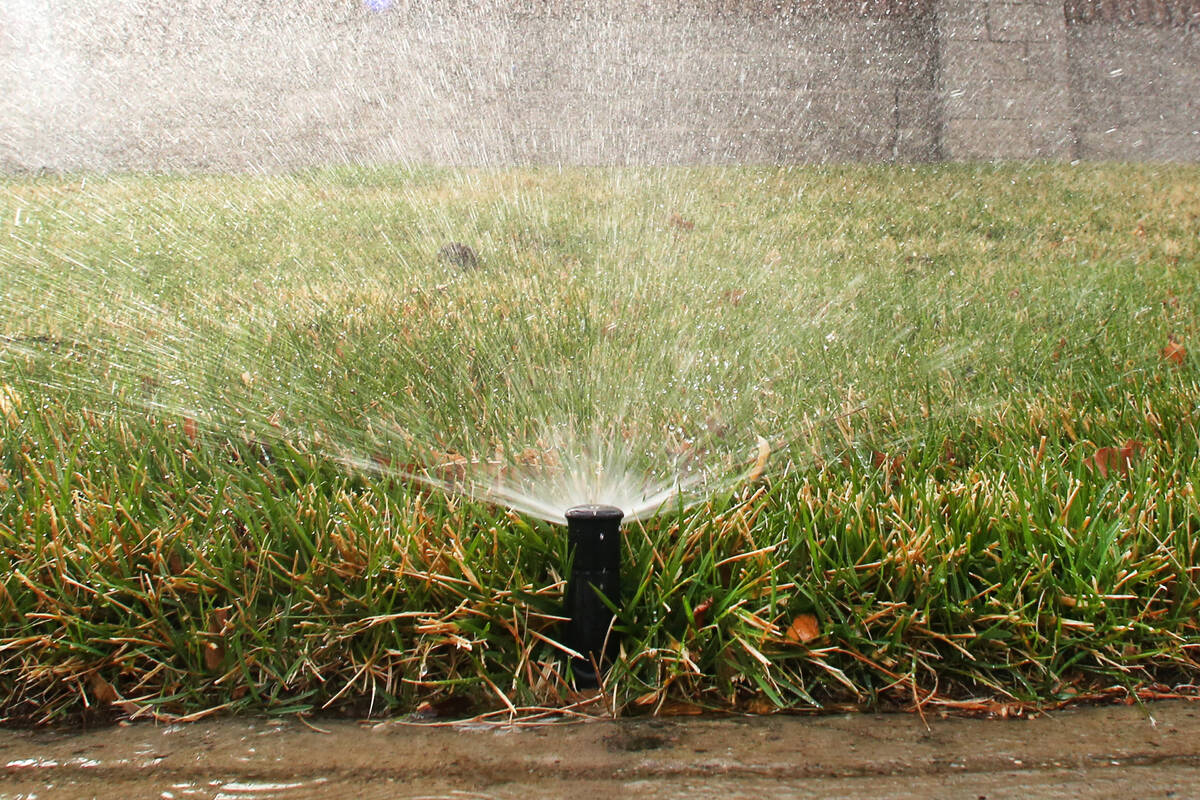Grass ban: Proposal would make turf illegal in new housing developments
It could soon be illegal to install grass in new developments in the Las Vegas Valley.
The Southern Nevada Water Authority board of directors is scheduled to consider a resolution Monday that would pave the way for prohibiting the installation of turf in all new developments, except at schools and in parks and cemeteries.
If the board approves the resolution, the agency will work with municipalities to update local codes.
It’s a proposal that comes as water officials in Southern Nevada seek new routes to conservation. Two decades of drought have parched the Colorado River leading to the first federally declared water shortage for Lake Mead.
“With diminishing water resources dependent on an uncertain climate moving forward, it is necessary to ensure that our community develops in the most efficient way possible,” an agenda item for the proposal states. “Further restricting new turf installations and the installation and use of spray irrigation promotes water efficiency and will help sustain our community into the future.”
Outdoor use is key
Because nearly every drop of water used indoors in Southern Nevada is treated and returned to Lake Mead for later use, conservation here depends almost entirely on how water is used outside. Irrigation accounts for more than half of Nevada’s allocation of Colorado River water each year.
The river supplies about 90 percent of Southern Nevada’s water.
Existing regulations prohibit grass in front yards and allow for backyards to have 50 percent of the yard’s area covered in grass.
Homeowners in existing developments would still be able to add grass to their backyard as long as it complies with the 50 percent cap, but the water authority urges water-efficient landscaping instead. No resident who already has grass in their yard would be forced to remove it.
Colby Pellegrino, the water authority’s deputy general manager of resources, told attendees at a Colorado River conference in Las Vegas on Wednesday that live grass consumes about 75 gallons per square-foot in the Las Vegas Valley.
“It’s a water use we can’t afford, and it’s very hard to manage when it’s in people’s backyards,” she said.
The agency has surveyed the valley through aerial imagery and estimates about 480 acres of turf is installed every year, she said.
Kyle Roerink, executive director of the Great Basin Water Network, said the turf-ban proposal sets the right example for upper basin states and underscores the dire situation on the river.
“The ultimate question for the (Southern Nevada Water Authority) is, will this water actually be conserved, or will it be repurposed? That’s what we’re going to have to continue to grapple with as a society in the West.”
Repurposing water, he said, does not count as conservation.
The water authority has aggressively pursued the removal of grass in Southern Nevada for decades.
Since 1999, the agency has offered money to homeowners who convert their lawns to desert landscaping. The program has saved billions of gallons of water by converting more than 200 million square-feet of grass.
This year, Gov. Steve Sisolak signed a law requiring nonfunctional grass in Southern Nevada to be removed by the end of 2026. This includes grass between roads and sidewalks, in medians and traffic circles, and decorative grass outside businesses, housing developments and other similar areas.
Evaporative cooling moratorium
The board is also scheduled to consider a moratorium on evaporative cooling units in new developments. Such units are used in large commercial buildings, like resorts on the Strip, and represent Southern Nevada’s second-largest consumptive use of water.
When the Strip shut down in response to the pandemic, it revealed evaporative cooling used more water than officials had known, Southern Nevada Water Authority General Manager John Entsminger told the Clark County Commission at a zoning meeting this month.
Evaporative coolers work by blowing outdoor air over water-soaked pads. The water then evaporates from the pads, cooling the air. Large commercial buildings use a more complex process of chilled water and fans to cool the air.
In addition to the turf ban and evaporative cooling moratorium, the water authority board of directors will consider adopting a new water resource plan, a 50-year outlook that gets updated annually to help officials in Southern Nevada prepare to meet future water demands.
The plan sets a new goal for per capita water consumption, dropping it from 105 gallons per person, per day, to 86 gallons per person, per day, by 2035.
This year’s plan, if approved, will include a more conservative approach than the water authority has used in the past to model how much water will flow through the Colorado River in the future.
“What we have seen on the Colorado River over the past 20 years is that we likely need to be prepared for lower flows on the river … so we can continue to ensure that we are planning for reality,” water authority spokesman Bronson Mack said.
Contact Blake Apgar at bapgar@reviewjournal.com or 702-387-5298. Follow @blakeapgar on Twitter.




















